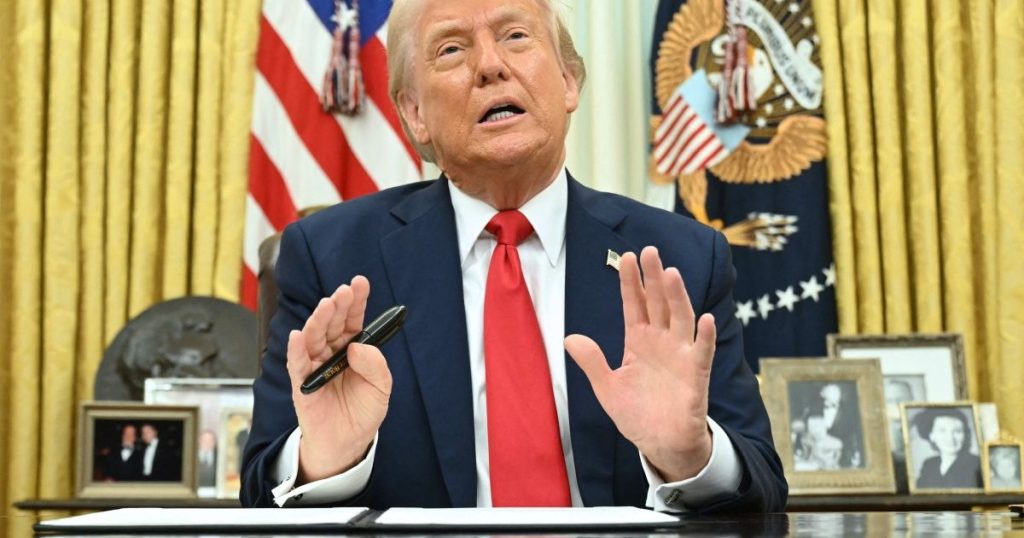Nigerian Exporters Face Uncertainty Amidst US Tariff Turmoil and Global Trade Shifts
The recent announcement and subsequent suspension of reciprocal tariffs by the United States have left Nigerian exporters grappling with uncertainty. While the 90-day pause offers a temporary reprieve, concerns linger about the potential ripple effects on global trade and the competitiveness of Nigerian non-oil exports. Stakeholders are divided on the potential impact, with some fearing a downturn in demand while others see an opportunity for strengthening trade relations outside the US.
The US government’s justification for the tariffs, citing Nigeria’s import restrictions on food and pharmaceuticals, has added another layer of complexity to the situation. The Manufacturers Association of Nigeria Export Promotion Group (MANEG) has urged the Nigerian government to engage in diplomatic discussions with the US to address the issue and seek a reconsideration of the tariffs. They emphasize the potential negative impact on Nigerian exporters, particularly in light of existing challenges such as high production costs, infrastructure deficits, and exchange rate fluctuations.
The interplay of these factors creates a challenging environment for Nigerian businesses seeking to expand their global reach. The uncertainty surrounding the future of US trade policy adds another layer of complexity to an already intricate landscape.
Dr. Benedict Obhiosa, Secretary of MANEG, expressed concern about the potential for a global chain reaction triggered by the US tariffs. He warned that other major export destinations for Nigerian products in Europe and Asia might follow suit, leading to a significant decline in non-oil export volumes. He suggested that Nigerian exporters explore new markets beyond the US to mitigate the potential impact of the tariffs. This diversification strategy would require navigating new regulatory landscapes, understanding different consumer preferences, and building new trade relationships.
Conversely, Gabriel Idahosa, President of the Lagos Chamber of Commerce and Industry (LCCI), presented a more optimistic perspective, viewing the situation as a potential opportunity for Nigeria. He argued that the minimal direct trade between Nigeria and the US would limit the severity of the impact. Additionally, he highlighted the increasing interest from global suppliers seeking alternative markets outside the US, with countries like Sweden, Switzerland, and Poland showing growing interest in Nigeria. This shift in global trade dynamics could create new opportunities for Nigerian exporters to access previously untapped markets.
Furthermore, Idahosa emphasized the potential for Nigerian exporters capitalize on the current global trade realignment by focusing on other countries like Canada, Australia, Japan, and India. This diversification strategy could help mitigate the risks associated with over-reliance on a single market and strengthen Nigeria’s position in the global trade arena. He also noted that the Nigerian government is pursuing a strategic approach, reporting the US tariffs to the World Trade Organization (WTO) as a violation of WTO principles, but refrained from imposing retaliatory tariffs.
The contrasting viewpoints highlight the complex and multifaceted nature of the situation. While the short-term impact of the US tariffs remains unclear, the long-term consequences could be significant for Nigerian exporters. The ability to adapt to changing global trade dynamics, diversify into new markets, and navigate the complex regulatory landscape will be crucial for their success.
MANEG’s call for diplomatic engagement underscores the importance of international cooperation and the need for a rules-based trading system. The WTO’s role in mediating trade disputes and ensuring fair competition will be crucial in navigating the current challenges and preventing further escalation of trade tensions. The 90-day pause offers a window of opportunity for dialogue and negotiation, which could lead to a more stable and predictable trading environment for Nigerian exporters and the global economy.
While the US remains a significant player in global trade, the increasing interest from other countries presents a unique opportunity for Nigeria to diversify its trading partners and strengthen its economic ties with other regions. This diversification strategy could reduce reliance on a single market and enhance Nigeria’s resilience to future trade disruptions. The Nigerian government’s cautious approach, coupled with its engagement with the WTO, reflects a commitment to upholding international trade rules and seeking a peaceful resolution to the current trade dispute.
As the 90-day pause unfolds, Nigerian exporters will need to adapt to the evolving global trade landscape. Diversification of markets, strategic partnerships, and a focus on value-added products will be essential for maintaining competitiveness and capitalizing on new opportunities. The Nigerian government’s ongoing diplomatic efforts and engagement with international organizations like the WTO will play a vital role in shaping the future of Nigerian trade and ensuring a level playing field for its exporters.
The current situation also underscores the importance of domestic reforms to enhance the competitiveness of Nigerian exports. Addressing challenges such as high production costs, infrastructure deficits, and exchange rate volatility will be crucial for attracting foreign investment and fostering sustainable economic growth. Strengthening domestic industries and promoting value-added exports will enhance Nigeria’s position in the global marketplace and reduce its vulnerability to external shocks.
The uncertainty surrounding the future of US trade policy underscores the need for a proactive and strategic approach to trade diversification. Exploring new markets, building strong trade relationships, and enhancing the competitiveness of Nigerian products will be essential for navigating the changing global landscape. The current situation presents both challenges and opportunities for Nigerian exporters, and their ability to adapt and innovate will determine their success in the years to come.














